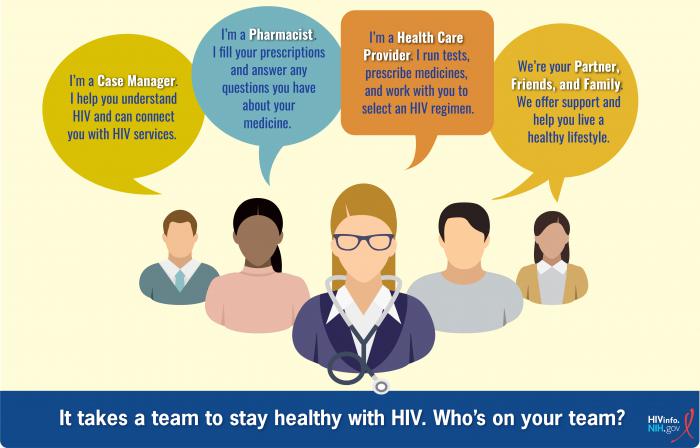Types of Providers
Who Can Provide My HIV Care?
If you’ve recently received an HIV diagnosis, many health care providers can provide the HIV care you need. Prompt medical care and treatment with HIV medicines as soon as possible is the best way to stay healthy.
At first, don’t be concerned about finding the perfect provider. The most important first step is to meet with a provider who can order your first lab tests and start you on treatment with HIV medicines as soon as possible. You can change providers after you start treatment.
When choosing your provider, look for someone who has a great deal of experience treating HIV. This matters because the more HIV experience your provider has, the more familiar they will be with the full range of treatment options that exist today, as well as the unique issues that can come up in HIV care over time. Also look for someone you feel comfortable with and trust.
What Will My HIV Health Care Provider Do?
Your HIV health care provider will lead your health care team. They will:
- help you determine which HIV medicine is best for you,
- prescribe HIV medicine (called antiretroviral therapy or ART),
- monitor your progress and help you manage your health, and
- put you in touch with other HIV providers who can address your needs.

Who Will Be on My HIV Care Team?
In addition to your HIV health care provider, your team may also include others who are experts in taking care of people with HIV.
Who is on your team will depend on your health care needs and the way your health care system, clinic, or office operates. It should also be based on your preferences and what will work best for you.
The types of professionals who may be involved in your HIV care include:
Health care providers
- Medical doctors, nurse practitioners, or physician assistants are health care professionals who are trained to practice medicine, including examining patients; diagnosing, treating, and managing diseases, injuries, and health conditions; prescribing medicines; and providing medical advice.
Allied health care professionals
- Nurses provide and coordinate patient care as part of a health care team.
- Mental health providers, such as psychologists, psychiatrists, or counselors, diagnose mental health conditions and provide different kinds of mental health support, depending on their education, training, and licensing.
- Pharmacists provide prescription medicines ordered by the HIV health care provider and answer questions individuals may have about their medicine.
- Nutritionists/dietitians advise people on what to eat in order to stay healthy or achieve a specific health-related goal.
- Dentists diagnose and treat problems with a person’s teeth, gums, and related parts of the mouth. They also provide advice and instruction on taking care of teeth and gums and on diet choices that affect oral health.
Social service providers
- Social workers help people cope with issues in their everyday lives.
- Case managers help people find the support and services they need, develop a services plan, and follow up to make sure that services are provided.
- Substance use/abuse specialists provide advice, treatment, and support to people who have problems with substance use.
- Patient navigators provide support and guidance to people by helping them "navigate" through the health care system. Navigators can be health care workers, social workers, those who work for community-based organizations, or peers.